Despite (multiple) trepidations and a refusal to even try going backwards, Nova Weetman manages several circuits of the rink, while cheerily expounding on career choices, resilience, creating with friends, teamwork, jelly-people and plotting (or not).
Then we head to the Ice HQ café for a latté and in-depth discussion with Tania covering: memoir; writing in place of therapy; and the sheer terror of putting a personal work out in the world.
A wonderfully generous interview with a bold, warm and hilarious author.
Find out more about Nova here
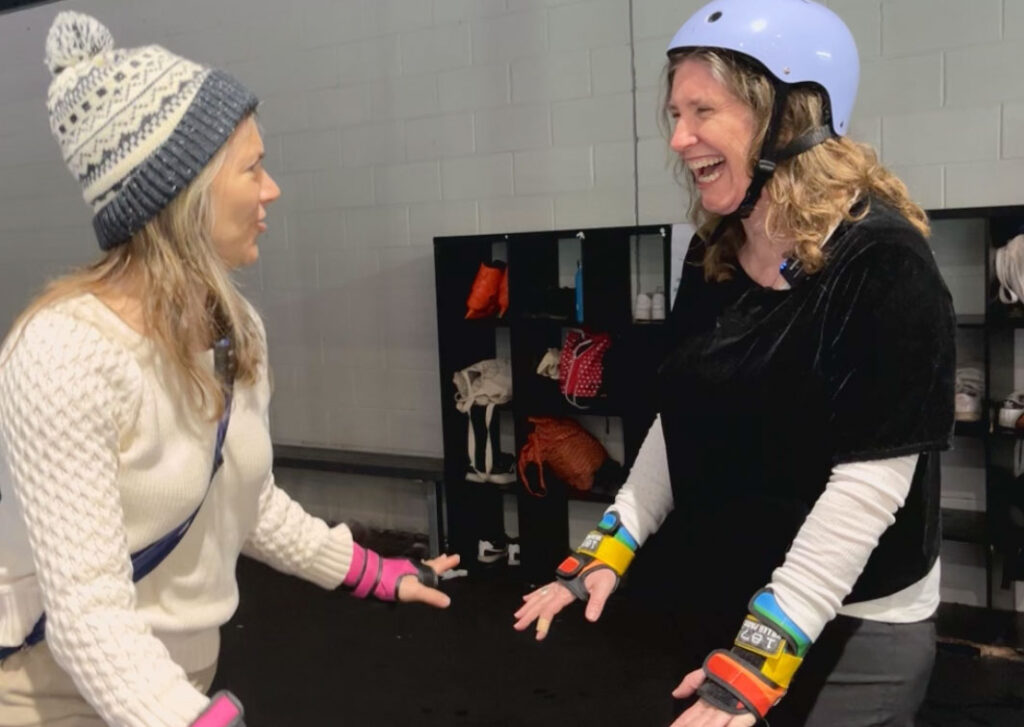
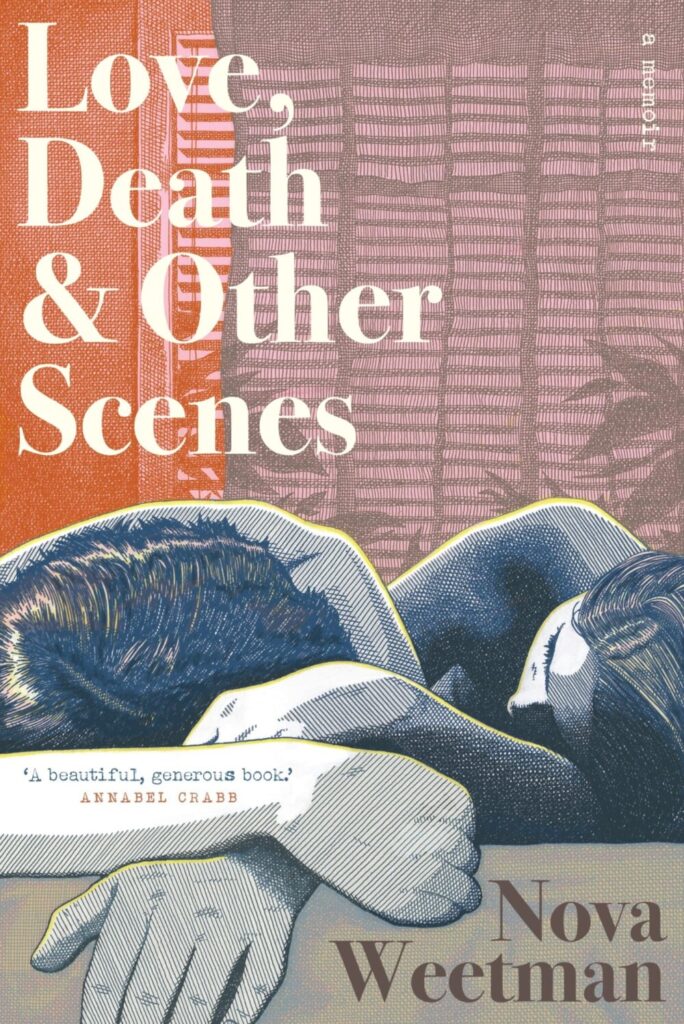
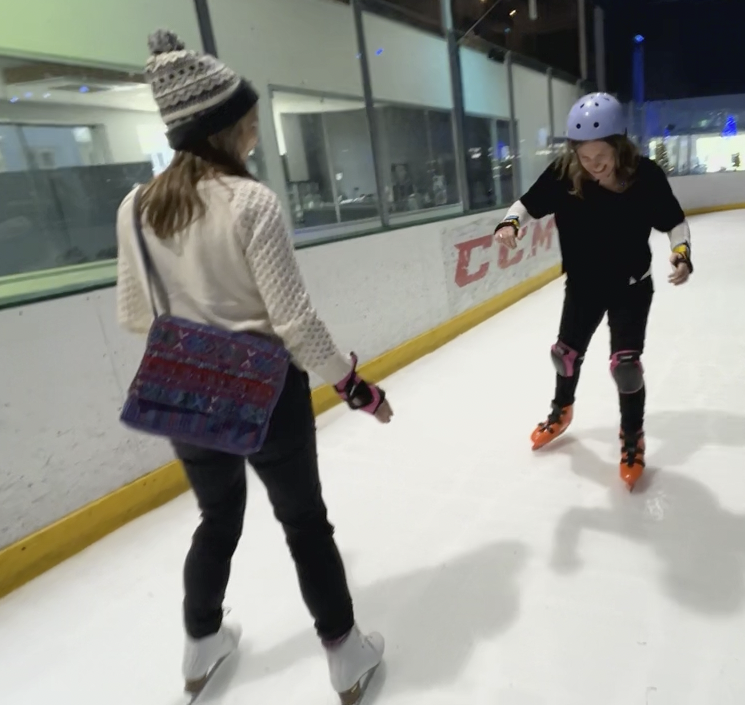
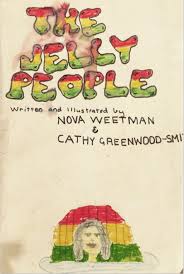
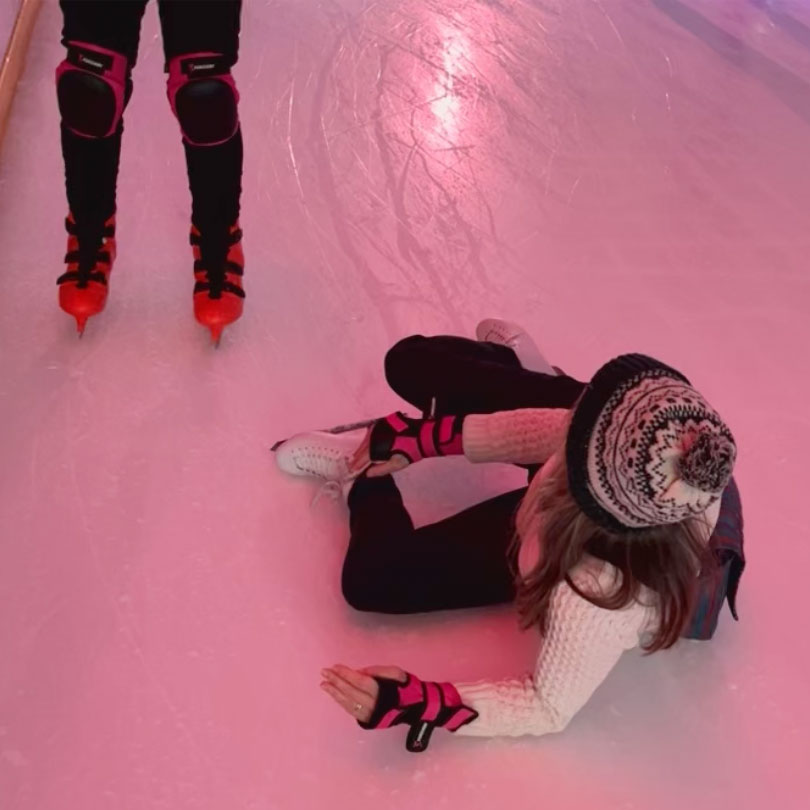
CHECK OUT THE TRAILER BELOW:
TRANSCRIPT
FULL TRANSCRIPT OF INTERVIEW HERE
GETTING READY
Lucinda: And they should be, you know, tight enough on the top.
Nova: They’re pretty tight around my ankles. That’s such a nice feeling.
Lucinda: And you’ve got warm socks on?
Nova: I’ve got warm socks on. Yep. Okay. Is that already open? No.
Lucinda: So, this is the point where I ask you… What do you do to relax?
Nova: Well, I don’t ice skate.Let me tell you right now What do I do to relax? I op shop. A lot. When I’m writing., particularly.
Lucinda: So what’s your best op shop find?
Nova: Probably a beautiful, German mid-century vase.
Lucinda: Wow… I love op-shopping. I think creative people like it a lot.
Nova: Yeah – I do too.
Lucinda: Because you get… unexpected choices.
Nova: Yes. And I like thinking about who it belonged to. I like that kind of idea of a story, I think.
Lucinda: Yeah, all that history.
Nova: I do that. And I DO exercise. I go to the gym. But I don’t ice skate. I am mildly terrified. I’m just going to put that out there right now. It’s got quite a disco feel, because it’s the end of term.
Lucinda: I know there’s like lots of teenagers here. There’s Santa lights…
Nova:…. and they can actually skate, which is really intimidating. There’s little kids learning how to skate.
Lucinda: Yeah, most of these people are regulars.
Nova: The ones that can skate are regulars. Really?
Lucinda: Yeah, we see them every week.
Nova: So you come every week?
Lucinda: Pretty much, yeah.
Nova: You come every week.
Lucinda: Yeah. Tania’s quite bitter and twisted because I’ve overtaken her in the ice skating. Cos she started first, and then she couldn’t continue, and I took the lessons. Which brings me to… White Boots! Do you remember the story?
Nova: Yes yes… Noel Streatfield. So I’m Harriet, and she’s Lalla.
Nova: Oh! I love that.How many writers can actually skate? That’s what I want to know.
Lucinda: Well, there’s quite a few … You’re interviewing me now!
Nova: Emily Gale can skate. Just letting you know.
Lucinda: Oh can she!
Nova: Yesterday I was talking to her and she said “Oh how fun!”
And I went, “I’m going to tell Lucinda you can skate.”
And she went “Oh no no no don’t!”
And I went “I so am”.
Lucinda: Nice.
Lucinda: Okay, so my question was um, how do you manage your writer…. … your work life balance.
Nova: My work life balance. Do I manage it, I wonder? I think I’m really good at working really hard and then I’m really good at relaxing.
Lucinda: Yeah, well, that’s good.
Nova: I’m really good at just going: “I’m just going to read for 7 hours” or “I’m just going to lie in bed and watch a whole television show.”
Lucinda: That’s a rare quality.
Nova: I know I’m really good at being lazy. Basically.
Lucinda: That can happen but… often that kicks in when you’re actually emotionally completely exhausted. So if you can do that before you reach that point…
Nova: I think I’m really good at just deciding that I’ve had enough.
Lucinda: Yeah.
Nova: So unless I’m actually having to do work, unless I’m having to write for money, I’m quite good at switching off.
ONTO THE ICE
Lucinda: That’s so good.
Nova: So terrified.
Lucinda: This is your journey to ice skating…
Nova: OMG look at that girl! Amazing!
Lucinda: I always wanted to be able to do that… They’ve got a cordoned off area, for people to do their turns now.
Nova: For good people?
Lucinda: Yeah.
Nova: Nice.
Lucinda: I think this is really good. I think. Just just shuffle little bit longer. And try not to look down.
Nova: Okay.
Lucinda: So you’re sort of, you’re not leaning back, but you’re kind of looking up.
Nova: Yeah. Wow. I’m trying not to laugh.
Lucinda: When I first came to the rink with Tania, she had to hold my hand.
Nova: Really?
Lucinda: Yeah.
Nova: I’m not quite sure how you actually relax.
Lucinda: You don’t. The way you get speed is by pushing into the ice. You’re doing really well. I would hold on to the side and regain your balance a little bit.
Nova: Okay.
Lucinda: Now, another thing we can do is we can practise a fall.So, I’ll do it… I’ll show you.
Nova: You go to the side, don’t you?
Lucinda: Yeah. Yeah. You get as low as you can. Yeah, that’s one thing. If you feel yourself losing your balance – go low. Yeah. And then just let yourself fall.
Nova: It feels like something I don’t want to do, Lucinda!
Lucinda: And then you get your hand, like this… So you go there. Yeah. And then let yourself fall to the side…
Nova: That hurts! And then you get up like this, don’t you.
Lucinda: Yeah. Get your hands out. One knee. Put your hands. On your knee and watch what I’m doing. I push up like that. It’s a bit daunting.
Nova: Right…that feels terrifying! I’ll do it over here.
Lucinda: Yeah, that was pretty good.
Nova: That’s so scary.
Lucinda: Focusing on your core being strong and looking down … I’m going to ask you about when you first started writing.
Nova: When I was very young, so it was kind of always the thing I loved. And I had an old typewriter and I used to write stories on my typewriter. I used to write Agatha Christie murder mysteries. And then I wrote a little story that I actually finished in grade six. I could never finish stories. But in grade six, I wrote one called The Jelly People, with my best friend Kathy. And it was a dystopian story of everyone being turned to jelly except for the people in the plane. And I was one of those people and everyone was just … these little globs of jelly when we re-landed on the earth.
Lucinda: Were they sentient jelly?
Nova: No! We were we were eating them! It was really grotesque. And whenever I do a school visit, I read it to the kids and they just look at me like I’m completely and utterly insane. So, yeah, that was the first thing I wrote. And I knew very early on I was going to be a writer.
Lucinda: Wow.
Nova: And I wasn’t very good at anything else, to be honest. Like I tried other jobs, but I don’t know. I just wasn’t very … I was never very good at them.
Lucinda: I look through your biography of books. Cause I’ve read a few of them with my children. But there were way more than I realized.
Nova: There’s heaps, isn’t there?
Lucinda: About 30 books?
Nova: No no no… 17.
Lucinda: Maybe they were different covers then.
Nova: Yeah, they might have been.
Lucinda: And are they all for… um.. are they all junior fiction?
Nova: Junior, middle grade, YA … So young adult. I started as a young adult writer. Like my first three books were young adult, and I thought I wanted to be well, I thought I wanted to write for adults, actually. But then… I wrote three young adult books and realised that that was a really lovely thing to do. And then I just got younger and younger. I think, because my daughter was the same age as Clem was in The Secrets We Keep I went: Oh, I can write a book about an 11 year old… and so E*** used to read it at night and tell me what was wrong with it. So it was this beautiful kind of discovery of that age, I think, and realising that that was the age I loved reading when I was a kid.
Lucinda: So, yeah, I was going to ask you about that because Tania asked me if there’s an age you particularly identify with.
Nova: Well, I think that, when I started writing young adult, I remember the publisher saying to me: I’m not sure this is actually your voice. I think you’re actually a younger writer. And I think the age that I loved reading the most was grade six … Grade four, five, six … year seven. Yeah. And I think that’s the age I write for the best.
Lucinda: Yeah.
Nova: So I think it’s definitely to do with the themes that I identify with are the themes that still resonate. I think from when I used to be a reader of that age.
Lucinda: I remember that age well too. It was beautiful. It’s a beautiful age. But you also love the melodrama at that age. All that emotion’s bubbling up…
Nova: Yes, yes, yes.
Lucinda: And I feel that in your stories.
Nova: Yes.
Lucinda: And then the children are genuinely suffering in these stories too. They’ve got very difficult family situations.
Nova: I did do a school visit the other day and the kids said to me: Are you ever going to write a book where someone doesn’t die? And I was like Yes, I am. I’m currently writing one that’s really happy and uplifting.
Lucinda: Is that the horse one?
Nova: Well, no because that’s about Ned Kelly. So that’s kind of like… I mean… it’s fun, but it’s yeah, heavy. I guess in terms of this sort of thematics of right and wrong, it’s quite weighty. No, I’ve got a new middle grade coming out the following year. That’s light. Hopefully. If I can keep it light.
Lucinda: So I’m going to show you lemons. (Does some backwards swizzles)
Nova: I’m not going backwards.
Lucinda: So you can do. them forwards.
Nova: No. (Does several slow forwards swizzles)
Lucinda: Yes, she’s doing so well!
Nova: But then I run out of steam, Lucinda!
Lucinda: Yeah, that’s it. You start from the middle, if you can. So that means you have to get a bit of balance and then you push off.
Lucinda: Yes.. So the collaboration…
Nova: Yeah.
Lucinda: So you collaborate with Emily Gale.
Nova: Yeah.
Lucinda: But you’re both writing.
Nova: We’re both writing, but we write it like … So we decide on the person we’re going to write about… Or the person we’re going to research, such as the old character, the historic character. We do the research. Then we kind of fight about who’s going to write which of the two characters.
(Not really….) Basically then we sort of plot the book together, and then we just we almost write it like a series of letters, where I’ll write a chapter, send it to her. She’ll write me the chapter back. And so it’s this beautiful, very fluid process. And we edit each other and we edit as we go.
So by the time the book is finished, it’s really quite tight. And Emily’s got incredible, incredible editing skills that I do not have. And she’s much more thorough than I am. So I think it’s been really good for me to learn from her. And to kind of lift my game! Because I think sometimes I’m really a bit slapdash. and she’s really, really good at not letting me get away with that.
Lucinda: That sounds brilliant.
Nova: We’re just supportive of each other. It’s not ever competitive. It’s just a really kind…
Lucinda: You’re working together making a lovely thing…
Nova: Yeah, really nice. It’s been a really nice process.
Lucinda: So if Emily’s not there and you are… writing… Who’s tidying up your writing?
Nova: My poor editor.
Lucinda: And do you feel like…
Nova: Do I feel embarrassed? Yes.
Lucinda: Do you feel the publishers have the time to do that level of editing with everyone?
Nova: No, but I think I’m really lucky. I think what I nail very early on is ‘voice’. And I think I nail character and I think I nail tone. And those things don’t change from the first draft to the last because they are the things I care about. And so when to get the voice right,
Lucinda: Are you thinking of a particular person when you’re doing it?
Nova: No…
Lucinda: Are you talking to a particular person?
Nova:: It feels like I just … I just get them really quickly. And particularly girls. I struggle more with boys, I think. So I’m trying to write boys at the moment and I it does feel harder, but I just it just feels like I kind of … I just remember what that felt like, that age. I don’t think I’ve changed that much from that age, actually. Like really, I still care about the same things.
Lucinda: Yeah.
Nova: And so once the voice is there, I think the editor is just looking at structure and I’m bad at structure. I always have been. So she often has to do a lot of suggestions around how to repair the structure of the book.
Lucinda: So when there’s a problem with the structure, would that be something doesn’t tie up. Pacing?
Nova: It doesn’t, no it’s more … The kind of arc isn’t right. So maybe the stakes aren’t high enough or I’ve spent too much time internally thinking about the character and not enough time having action happen. Yeah, because I think I’m just much more comfortable writing internal thought-based narrative and snappy dialogue is kind of what I love. That’s not enough for a book that’s not going to hold together. So I’m trying to get better at thinking about how to structure something. But it’s not… It’s not my natural thing. And even with the memoir, which obviously is all internal thought because it’s all my kind of voice, the editor came in and we did it. She did a huge re-structure on that book, after I’d finished it. Which really surprised me.
Lucinda: And would you be doing several books at the same time?
Nova: Yeah.
Lucinda: How does your head manage that?
Nova: Not very well.
Lucinda: And is that because you get bored?
Nova: I do get bored, yes. So I do get bored. So I’ll often have an edit on the go at the same time as I’m writing something new. Yeah. And at the same time I’m thinking about what will come next. So I imagine that a lot of the time, that feels exciting and like everything’s happening.
Lucinda: And then now and again, your head just gets full.
Nova: Yeah.
Lucinda: And you need to go and do something else.
Nova: And then I just … and then I write a lot of short… short essay stuff, which I really like because they’re a thousand words. They’re really easy to structure and they’re just me having a rant! I love that.
Lucinda: And do you just send that off to the Guardian?
Nova: I send that off to the Guardian and then hope that they’ll go: Yes, we love this!
Lucinda: And do they pay or do they just go: It’s an opinion piece…
Nova: No they pay. I wouldn’t do it if they didn’t pay. This is the thing, isn’t it? Like when you’re trying to monetise your craft.
Lucinda: Yes.
Nova: Which goes to what you were saying before. You spend a lot of time trying to work out how to do that efficiently.
Lucinda: Yeah.
Nova: But also how to keep a love for something that you…
Lucinda: Which is why I needed a new hobby.
Nova: Yes, I totally understand that. I do. I think that’s it, I guess. This was my passion.
Lucinda: Writing was my passion, and it still is. But to keep that passion I needed to do something else. Writing and illustrating, obviously. But illustration is really undervalued a lot of the time.
Nova: Yeah, well, I think what that does is it starts to undervalue how you see your work.
Lucinda: It makes you feel anxious, I can tell you that.
Nova: I think I did realize a lot like a few years ago that what I loved about writing way back when… was not worrying about the publishing. It was just falling into the world.
Lucinda: Yeah.
Nova: And that is what you lose when you are trying to do it professionally. And so I don’t know how you get that back in a way, because it’s so hard to have the time to lose money in order to work on something that you just want to write.
Lucinda: And you don’t want to do work cynically.
Nova: No, I don’t. I really don’t.
Lucinda: Because you can tell, I think.
Nova: Yeah. Yeah I think so too. I think yeah.
Lucinda: So how is this going then?
Nova: It’s going okay! I haven’t fallen over… My ankles are sore… But I think they always are, because I’ve got really flat feet. I think my feet roll in.
Lucinda: I wonder if you could try a spin.
Nova: No! You just want me to fall over on camera. Gee your feet hurt after a while, don’t they.
Lucinda: They don’t in these… (points to white leather boots)
Nova: No…cause they’re so soft… It’s the hard plastic on your ankle bone…
Lucinda: Yeah, they really … they’re made in one bit…
Lucinda: Would you like to come to the cafe for a bit?
IN THE CAFE
Tania: So, Nova… How was that for you?
Nova: Honestly, it was much nicer than I expected because I was so scared. I don’t know why I was so scared. I actually think it’s very good. It’s a very good idea to be talking while you’re skating because you’re not thinking. You’re not focused on your body.
You’re just relaxing. And that’s a very clever device that you guys have constructed.
Tania: So… did you learn anything new?
Nova: Yes. Well, I learned that I could let go of the wall. I think the last time I went… actually the only time I’ve went in years and years was, at the Rising festival. It’s got about 7000 people on the tiny ice rink. And the ice is just dug up because there’s just… and it’s awful. And I was terrified and I just hung on and I felt much, much more relaxed today. And everybody skating didn’t feel … they just felt confident. So that made me feel confident. Didn’t make me feel that someone was going to plow into me and knock me over.
Tania: That’s good. I thought you did amazing.
Nova: Thank you.
Tania: So for you, what’s the most difficult part of being a writer?
Nova: I think why we all start writing or illustrating or being creative is because we love it. And I feel like the more you move through your career, the more you’re doing it for an outcome and the less you’re doing it because you just want to fall into it. And I think I miss falling into it. Sometimes I do just want to play, but I don’t have the time to because I’m having to deliver something or I’m having to make money. And so I just doesn’t feel like I have that luxury anymore. And I feel like that’s that’s a strange and unexpected thing to happen I think as a creative person.
Tania: And people don’t understand that, when they start out… and you try to explain…
Nova: No! You’re just desperate to be published when you start out.
Tania: Yeah, I think it gets i harder.
Nova: And there’s more pressure on yourself.
Tania: I think it’s would be so much harder to be rejected and … it happens all the time … For your third or fourth book.
Nova: Yeah, definitely. Yeah. And I think too, there’s pressure on you to sell, there’s pressure on you, you know, to improve and all of that, all of those pressures I think are really hard. And I think if you’re sort of looking at your career going, it’s probably not that changed in the last … it hasn’t really changed that much in the last ten years. So I don’t know.
And all that pressure comes from self as well.
Tania: Absolutely.
Nova: Yeah.
Tania: So the next question, yeah, it kind of is connected to that. So if you could talk to your younger self as you were starting out, what would you advise them?
Nova: I think trying not to focus so much on what other people think of your career and also not to pit yourself against other people, but to try and do what it is you love about writing yourself, and that is write the sorts of stories you want to write and maybe they’re quiet stories – I think I do naturally write quite quiet stories. And not kind of go: Well, why aren’t I selling 100,000? Why aren’t I huge in America? All of that stuff. I think that you, especially if you are naturally competitive, or naturally trying to have something that’s … where you’re pushing yourself. … I think you do look at everybody else and imagine that they’re doing a lot better. And I think it’s only at this age that I’ve started to let that go. And I think I would love to have gone back when I was much younger and let that go much earlier. But I guess you can’t. I guess you have to go through it – don’t you.
Tania: I know, it’s so hard.
Nova: It is. It’s really hard. So really because it’s not why we do it either. We’re not writing to be better than someone else. And yeah, that is such a huge part of it. Yeah. And it’s, and it’s been enforced on us from everything else and that’s so hard. And I think it’s a really hard …
Tania: Awards, and shortlists and …
Nova: And sales and your own publishing house and your agent and your friends and everything around you has that kind of element. It’s like, I don’t want that to be why I write. I want to write because I like writing. But I think also the very fact that we have all got to this point in having a professional writing career means we are competitive. And it means we are driven. Because you can’t do it if you’re not.
No, you can’t just get here through luck. You have to actually show up, do the work, fight hard. Keep trying… Complete a project, put yourself on the line and go back and do it all again the next day. Like it’s HARD. It’s a really hard thing.
I don’t know.
Tania: It’s soul destroying.
Nova: Why do we do it? I think we should take up ice skating. I think we should all become ice skating champions. Surely it’s not too late.
Tania: Would you like to tell us about your upcoming book, Love, Death and Other Scenes?
Nova: Sure. So it’s a memoir … which whenever you say that to someone, people say: Really? What have you done with your life? That’s like the best question. You’ve been to the moon? Yeah. I’ve done amazing things.
No, it’s not. It’s not that kind of memoir. It’s a THEMATIC memoir rather than … My Life is Amazing memoir. So it is kind of actually just about loss. But loss in all sorts of forms. Say, my mom dying and my partner dying in 2020 then my daughter turning 18, and getting old, you know, losing your looks, whatever it is.
Just like all of those forms of loss. I guess It feels like it’s a sort of ‘spoilt’ process because it’s just been me thinking about myself. Which you don’t do when you’re writing fiction because you’re always thinking about the characters.
But this has been … Yeah, just a very lovely kind of therapy. I couldn’t find a therapist. That’s why I started writing it, because I couldn’t actually find anyone who would see me during COVID. Yes, there was no therapist available, so I started writing. And my agent, who’s in America in New York – and it was the height of COVID when so many of her friends were dying of COVID – said: I think this could be a book that is bigger than just your experience, but about generalized loss. And so I started sort of playing around with it, and it was just like therapy. And then it became something more than that…
Tania: So was it harder or easier to write than fiction?
Nova: Well, I think nonfiction for me is much easier. And I don’t know why. I think it’s something to do with structure in the way I imagine that narrative arc. And my partner who died was a playwright. And so when the editor got the kind of manuscript, it was quite chronological and she broke it into three acts, which is where the title came from, and sort of shaped it like a play. So that it’s thematically linked in those three acts. So it’s not chronological. It’s much more thematically kind of shaped. And I think, because the pieces are smaller, there’s not a continuous arc. I find that easier to write. You’re sharing yourself, but you’re not kind of constructing characters. I don’t know. It’s just a different writing
Tania: And, editing that, how did that feel? Because, it’s your personal…
Nova: And it was amazing because UQP let me have … I’ve worked with a particular children’s editor there a lot and I love Christie, like she’s just been a great editor for me and they let her edit this. And she’s mostly done children’s books, so it was fantastic even having them have, I guess, just knowing how important it was that we already had a pre-existing relationship. I got very sick of reading it. I just thought, I don’t want to read about myself anymore. Ever again. I was so sick of thinking about myself. But the actual editing was quite a good process, I think. And it wasn’t a huge, horrible edit. Like, my children’s books are often just such a mess. They’re just like, completely pulled apart and restructured. This felt like a lot of the elements were already right, which was a kind of unique experience for me because I’m not usually in that kind of shape. So yeah. Yeah.
Tania: You’re not making it up?
Nova: Yeah, exactly. Yeah.
Tania: And when does the book come out?
Nova: April three. So. Yeah, I know. So it’s getting to that kind of scary, slightly frightening moment where you realize you’re going to have to start talking about it at festivals. It’s scary because it’s personal and it’s scary because it’s grown ups. Like I’m fine talking to kids about anything at all, but talking to adults, this feels terrifying. I don’t know.
Lucinda: It’s ME in the hot seat now, Nova, and I just want you to say: Thank you! And I hope you enjoyed it.
Nova: I have.
Lucinda: And I will look forward to your next book coming out… And I’m going to get back on the ice now. It’s very noisy in here… So…
Lucinda & Tania: Goodbye!
Subscribe to the Writers on Ice Newsletter – for book giveaways*, news, and updates on new episodes:
* Australian residents only
ALL EPISODES
Genre shifts, giving crime victims agency and the value of a short bio with Mandy Beaumont
Writers on Ice (Lucinda Gifford and Tania Chandler) interview author Aoife Clifford
Writers on Ice acknowledges the Wurundjeri people as the Traditional Owners and Custodians of the country we work upon. We pay respect to Elders past, present and emerging. We recognise all Aboriginal and Torres Strait Islander peoples’ continuing connection to land, waters and culture, and acknowledge that sovereignty has never been ceded and treaty is yet to be signed.

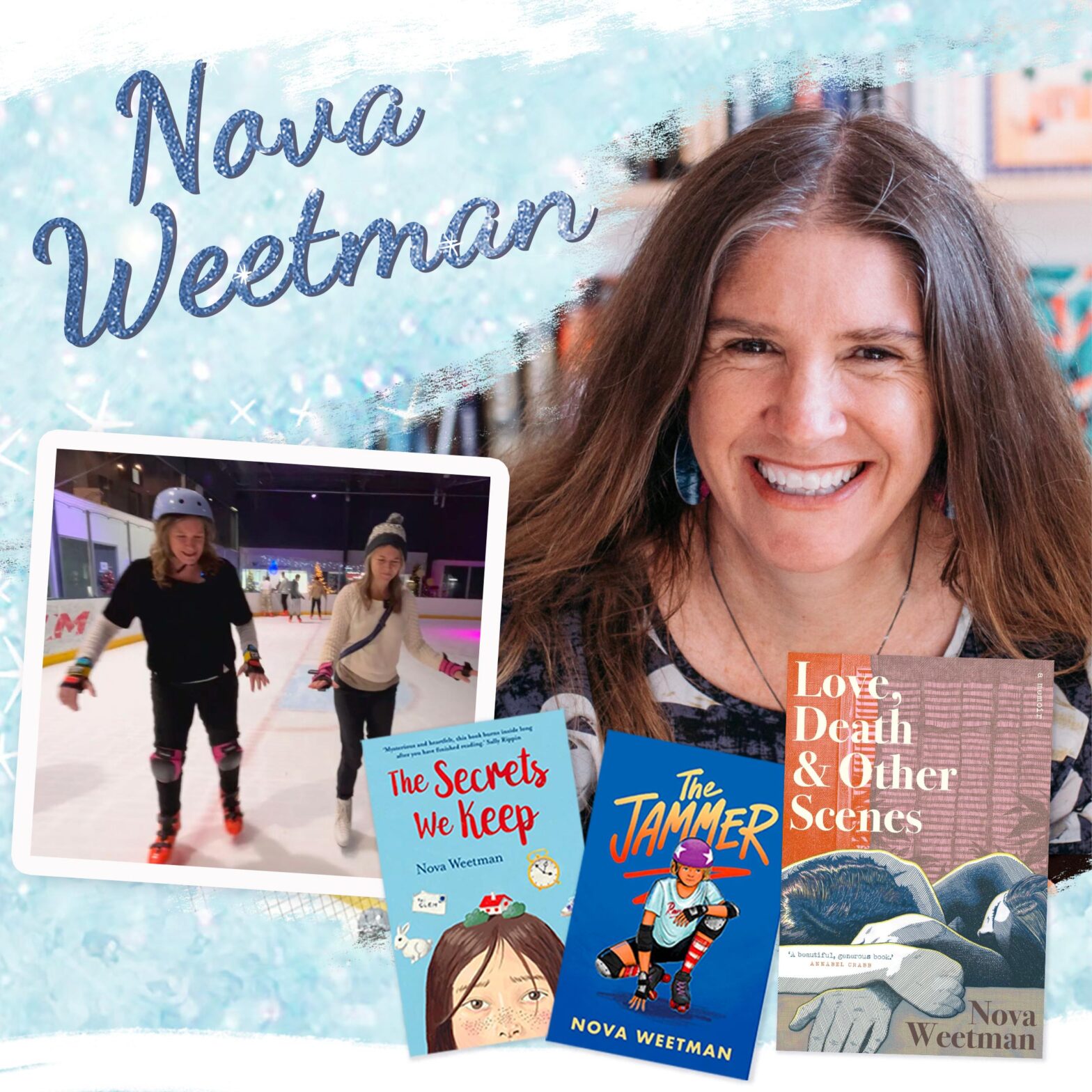

Teen trauma, relationships and wearing many hats with Dr Bella Elwood-Clayton